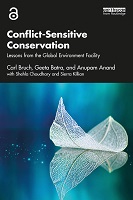Conflict-Sensitive Conservation
Proposal review
Lessons from the Global Environment Facility
| dc.contributor.author | Bruch, Carl | |
| dc.contributor.author | Batra, Geeta | |
| dc.contributor.author | Anand, Anupam | |
| dc.contributor.author | Chowdhury, Shehla | |
| dc.contributor.author | Killian, Sierra | |
| dc.date.accessioned | 2023-08-09T09:07:14Z | |
| dc.date.available | 2023-08-09T09:07:14Z | |
| dc.date.issued | 2024 | |
| dc.identifier | OCN: 1376325960 | |
| dc.identifier.uri | https://library.oapen.org/handle/20.500.12657/75315 | |
| dc.description.abstract | This book provides an empirically formulated foundation for conflict-sensitive conservation, a field in which the existing literature relies primarily on anecdotal evidence. Seeking to better understand the impact of conflict on the implementation and outcomes of environmental projects, the Global Environment Facility (GEF) Independent Evaluation Office and the Environmental Law Institute undertook an evaluation of GEF support to fragile and conflict-affected contexts. Following a qualitative and quantitative analysis of documents from more than 4,000 projects, the research team discovered a statistically significant negative correlation between a country’s Fragile States Index score and the implementation quality of environmental projects in that country. In this book, the evaluation and research team explain these groundbreaking findings in detail, highlighting seven key case studies: Afghanistan, Albertine Rift, Balkans, Cambodia, Colombia, Lebanon, and Mali. Drawing upon additional research and interviews with GEF project implementation staff, the volume illustrates the pathways through which conflict and fragility frequently impact environmental projects. It also examines how practitioners and sponsoring institutions can plan and implement their projects to avoid or mitigate these issues and find opportunities to promote peacebuilding through their environmental interventions. Examining data from 164 countries and territories, this innovative book will be of great interest to students and scholars of environmental management, conservation, international development, and the fast-growing field of environmental peacebuilding. It will also be a great resource for practitioners working in these important fields. The Open Access version of this book, available at www.taylorfrancis.com, has been made available under a Creative Commons Attribution-Non Commercial-No Derivatives 4.0 license. | en_US |
| dc.language | English | en_US |
| dc.subject.classification | thema EDItEUR::R Earth Sciences, Geography, Environment, Planning::RN The environment::RNK Conservation of the environment | en_US |
| dc.subject.classification | thema EDItEUR::G Reference, Information and Interdisciplinary subjects::GT Interdisciplinary studies::GTU Peace studies and conflict resolution | en_US |
| dc.subject.other | conflict;conservation;fragility;implementation guidance;international development;peace;peacebuilding | en_US |
| dc.title | Conflict-Sensitive Conservation | en_US |
| dc.title.alternative | Lessons from the Global Environment Facility | en_US |
| dc.type | book | |
| oapen.identifier.doi | 10.4324/9781003351399 | en_US |
| oapen.relation.isPublishedBy | 7b3c7b10-5b1e-40b3-860e-c6dd5197f0bb | en_US |
| oapen.relation.isbn | 9781032397948 | en_US |
| oapen.relation.isbn | 9781003351399 | en_US |
| oapen.relation.isbn | 9781032397955 | en_US |
| oapen.imprint | Routledge | en_US |
| oapen.pages | 249 | en_US |
| peerreview.anonymity | Single-anonymised | |
| peerreview.id | bc80075c-96cc-4740-a9f3-a234bc2598f1 | |
| peerreview.open.review | No | |
| peerreview.publish.responsibility | Publisher | |
| peerreview.review.stage | Pre-publication | |
| peerreview.review.type | Proposal | |
| peerreview.reviewer.type | Internal editor | |
| peerreview.reviewer.type | External peer reviewer | |
| peerreview.title | Proposal review | |
| oapen.review.comments | Taylor & Francis open access titles are reviewed as a minimum at proposal stage by at least two external peer reviewers and an internal editor (additional reviews may be sought and additional content reviewed as required). |

